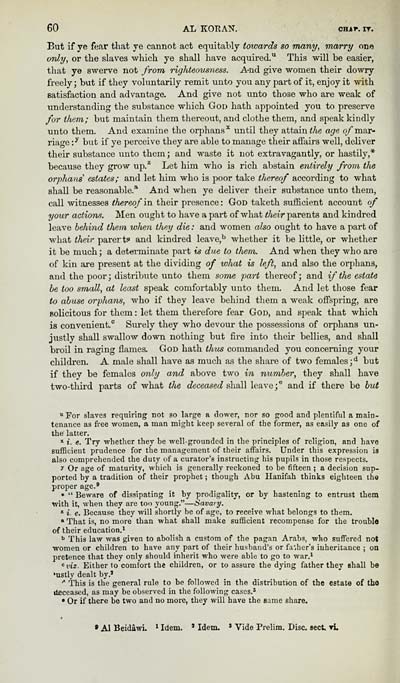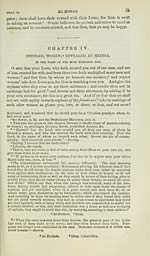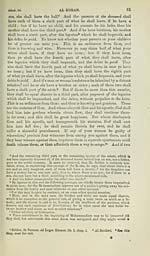Download files
Complete book:
Individual page:
Thumbnail gallery: Grid view | List view

60 AL KORAN. omr. it.
But if ye fea,r tiiat ye cannot act equitably towards so mani/, ma/rry one
ordy, or the slaves which ye shall have acquired." This will be easier,
that ye swerve not from righteovsness. A-nd give women their dowry
freely; but if they voluntarily remit unto you any part of it, enjoy it with
satisfaction and advantage. And give not unto those who are weak of
understanding the substance which God hath appointed you to preserve
for them; but maintain them thereout, and clothe them, and speak kindly
unto them. And examine the orphans^ until they attain ^Ae age, ofmav'
riage : ^ but if ye perceive they are able to manage their affairs well, deliver
their substance unto them ; and waste it not extravagantly, or hastily,*
because they grow up.^ Let him who is rich abstain entirely from the
orphans' estates; and let him who is poor take thereof according to what
shall be reasonable.* And when ye deliver their substance unto them,
call witnesses thereof in their presence : God taketh sufficient account of
your actions. Men ought to have a part of what their parents and kindred
leave behind tliem when they die : and women also ought to have a part of
what their parert3 and kindred leave, '^ whether it be little, or whether
it be much ; a determinate part is due to t/i£m. And when they who are
of kin are present at the dividing of what is left, and also the orphans,
and the poor ; distribute unto them some part thereof ; and if the estate
he too small, at least speak comfortably imto tliem. And let those fear
to abuse orphans, who if they leave behind them a weak offspring, are
solicitous for them : let them therefore fear God, and speak that which
is convenient. " Surely they who devour the possessions of orphans un-
justly shall swallow down nothing but fire into their bellies, and shall
broil in raging flames. God hath thus commanded you concerning your
childi'en. A male shall have as much as the share of two females;'^ but
if they be females only and above two in number, they shall have
two-third parts of what the deceased shall leave ; * and if there be but
" For slaves requiring not so large a dower, nor so good and plentiful a main-
tenance as free women, a man might keep several of the former, as easily as one of
the latter.
» t. e. Try whether they be well-grounded in the principles of religion, and have
sufficient prudence for the management of their affairs. Under this expression is
also comprehended the duty of a curator's instructing his pupils in those respects.
y Or age of maturity, which is generally reckoned to be fifteen ; a decision sup-
ported by a tradition of their prophet ; though Abu Hanifah thinks eighteen the
proper age.'
• " Beware of dissipating it by prodigality, or by hastening to entrust them
with it, when they are too young." — Savary.
'■ i. e. Because they will shortly be of age, to receive what belongs to them.
■ That is, no more than what shall make sufficient recompense for the trouble
of their education.^
•» This law was given to abolish a custom of the pagan Arabs, who suffered not
women or children to have any part of their husband's or fa'.her's inheritance ; on
pretence that they only should inherit who were able to go to war.^
" viz. Either to comfort the children, or to assure the dying father they shall be
•ustly dealt by.'
' This is the general rule to be followed in the distribution of the estate of tliO
ileceased, as may be observed in the following cases.*
• Or if there be two and no more, they will have the same share.
» Al Beidawi. ' Idem. * Idem. ' Vide Prelim. Disc. sect. Ti
But if ye fea,r tiiat ye cannot act equitably towards so mani/, ma/rry one
ordy, or the slaves which ye shall have acquired." This will be easier,
that ye swerve not from righteovsness. A-nd give women their dowry
freely; but if they voluntarily remit unto you any part of it, enjoy it with
satisfaction and advantage. And give not unto those who are weak of
understanding the substance which God hath appointed you to preserve
for them; but maintain them thereout, and clothe them, and speak kindly
unto them. And examine the orphans^ until they attain ^Ae age, ofmav'
riage : ^ but if ye perceive they are able to manage their affairs well, deliver
their substance unto them ; and waste it not extravagantly, or hastily,*
because they grow up.^ Let him who is rich abstain entirely from the
orphans' estates; and let him who is poor take thereof according to what
shall be reasonable.* And when ye deliver their substance unto them,
call witnesses thereof in their presence : God taketh sufficient account of
your actions. Men ought to have a part of what their parents and kindred
leave behind tliem when they die : and women also ought to have a part of
what their parert3 and kindred leave, '^ whether it be little, or whether
it be much ; a determinate part is due to t/i£m. And when they who are
of kin are present at the dividing of what is left, and also the orphans,
and the poor ; distribute unto them some part thereof ; and if the estate
he too small, at least speak comfortably imto tliem. And let those fear
to abuse orphans, who if they leave behind them a weak offspring, are
solicitous for them : let them therefore fear God, and speak that which
is convenient. " Surely they who devour the possessions of orphans un-
justly shall swallow down nothing but fire into their bellies, and shall
broil in raging flames. God hath thus commanded you concerning your
childi'en. A male shall have as much as the share of two females;'^ but
if they be females only and above two in number, they shall have
two-third parts of what the deceased shall leave ; * and if there be but
" For slaves requiring not so large a dower, nor so good and plentiful a main-
tenance as free women, a man might keep several of the former, as easily as one of
the latter.
» t. e. Try whether they be well-grounded in the principles of religion, and have
sufficient prudence for the management of their affairs. Under this expression is
also comprehended the duty of a curator's instructing his pupils in those respects.
y Or age of maturity, which is generally reckoned to be fifteen ; a decision sup-
ported by a tradition of their prophet ; though Abu Hanifah thinks eighteen the
proper age.'
• " Beware of dissipating it by prodigality, or by hastening to entrust them
with it, when they are too young." — Savary.
'■ i. e. Because they will shortly be of age, to receive what belongs to them.
■ That is, no more than what shall make sufficient recompense for the trouble
of their education.^
•» This law was given to abolish a custom of the pagan Arabs, who suffered not
women or children to have any part of their husband's or fa'.her's inheritance ; on
pretence that they only should inherit who were able to go to war.^
" viz. Either to comfort the children, or to assure the dying father they shall be
•ustly dealt by.'
' This is the general rule to be followed in the distribution of the estate of tliO
ileceased, as may be observed in the following cases.*
• Or if there be two and no more, they will have the same share.
» Al Beidawi. ' Idem. * Idem. ' Vide Prelim. Disc. sect. Ti
Set display mode to: Large image | Transcription
Images and transcriptions on this page, including medium image downloads, may be used under the Creative Commons Attribution 4.0 International Licence unless otherwise stated. ![]()
| Early Gaelic Book Collections > J. F. Campbell Collection > Koran: or, Alcoran of Mohammed > (214) |
|---|
| Permanent URL | https://digital.nls.uk/77136449 |
|---|
| Description | Volumes from a collection of 610 books rich in Highland folklore, Ossianic literature and other Celtic subjects. Many of the books annotated by John Francis Campbell of Islay, who assembled the collection. |
|---|
| Description | Selected items from five 'Special and Named Printed Collections'. Includes books in Gaelic and other Celtic languages, works about the Gaels, their languages, literature, culture and history. |
|---|

